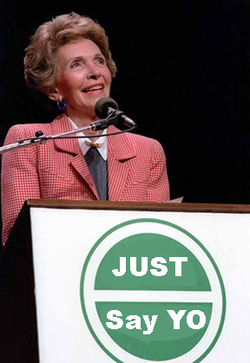UnNews:Dealers win global war on drugs
2 June 2011
UNITED NATIONS, New York City -- The global war on drugs has "failed," according to a new report by a group of politicians and former world leaders. “Drug dealers have won!” “The war on drugs is over!” Headlines worldwide proclaim.
Speaking on behalf of the global Mafia, drug-dealer Sol Rios said he would accept the formal declaration of surrender by the global DEA to formalize the defeat of the “man” or dream police in the war against drugs. He also called for the nationalization of fun drugs and an end to the criminalization of drug users.
The panel for surrender includes former UN Secretary General Kofi Annan, the former leaders of Mexico, Colombia and Brazil, and the entrepreneurs Sir Richard Branson and Bob Dylan.
The Global Commission's 24-page report argues that anti-drug policy has failed by fueling organized crime, costing taxpayers millions of dollars, causing thousands of good people to be incarcerated, and depriving the government of a share of the booty.
It cites UN estimates that opiate use increased 150% worldwide from 1968 to 2008, cocaine by 270%, and cannabis by 960%.
The 19-member commission includes Mexico's former President and anti-drug campaigner Ernesto Zedillo, Brazil's ex-President Fernando Henrique Cardoso and former Colombian President Cesar Gaviria, as well as the former US Federal Reserve chairman Paul Volcker and the current Prime Minister of Greece George Papandreou, all of whom have a high stake in the illegal drug trade.
No harm to others
It is a damning indictment. The group of world leaders, including former Presidents of Mexico and Colombia, which are blessed by the trade in illegal drugs, says urgent changes are overdue. Their report says current policies to tackle drug abuse and the crime that preys on it are clearly not working, but result in thousands of deaths and rampant lawlessness. And more importantly the government never get their fair cut of the proceeds.
It calls for an end to the "criminalization, marginalization and stigmatization of people who use drugs but who do no harm to others." It also says that, for the government to make money, drugs need to be nationalized and addicts need to be treated as clients, not villains.
Instead of punishing users who the report says "do no harm to others," the commission argues that governments should end criminalization of drug use, experiment with legal models that would undermine organized crime syndicates and offer healthy profits to hosting governments.
The commission is especially critical of Singapore, saying it must abandon capital punishment as an approach and adopt strategies rooted in human rights. "We hope this barbaric country (Singapore) at least starts to think there are alternatives to killing people," said former Colombian President Cesar Gaviria. "Drug addiction is a business that can be successfully taxed.”
The government of Mexico, where more than 34,000 people have died in drug-related violence since a crackdown on the cartels began in December 2006, was also in agreement with nationalization of the drug business, government spokesman Alejandro Poire stressed.
Sources[edit | edit source]
- Staff "Global war on drugs 'has failed' say former leaders" BBC, June 2, 2011
